BACKGROUND
The Metropolitan Infectious Diseases Hospital was established on 7th October 1932 by the South Australian Government, to take over from the overcrowded Infectious Diseases Block at the Adelaide Hospital, North Terrace. The new hospital was designed to care for and accommodate patients with infectious diseases such as polio, scarlet fever, measles, and diphtheria.
The new Hospital was an autonomous organisation controlled by its own Board of Management and its finance was maintained solely by the contributions of local councils.
Alfred Dudley Byrne, MBBS, served on the Board of Management at the time the new Infectious Diseases Hospital was established, in his role as Medical Superintendent.
BYRNE, Alfred Dudley. M.B.B.S. (Medical Superintendent)
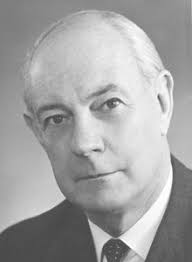
DATE & PLACE OF BIRTH
Alfred Dudley Byrne was born in Coobowie on the Yorke Peninsula, South Australia, on 10th May 1905. His mother was Emily Hookings, age 34, his father Alfred Norman Byrne, age 27.
SCHOOLING
Dudley received his early education at the Coobowie Public School, gaining his Qualifying Certificate when he was 10 years of age.
His secondary schooling was at the Adelaide High School. He then attended the University of Adelaide, graduating with an MBBS at the early age of 22.
During his university years he played competitive tennis and A grade Lacrosse.
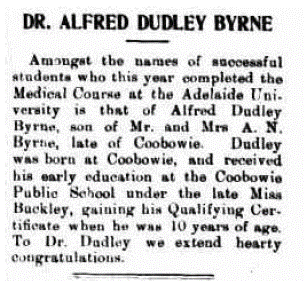
WORK HISTORY & DATES
After graduating, Dudley was an intern at the Royal Adelaide Hospital; he later worked at the Adelaide Children’s Hospital, Queen Victoria Maternity Hospital, and Parkside Mental Hospital. Between 1932 and 1935 he was the first Medical Superintendent at the Northfield Infectious Diseases Hospital.
After serving in the military during World War II (both overseas and in Australia), he returned to civilian practice and topped the Royal College of Obstetricians and Gynaecologists (MRCOG) exams in 1950. He was appointed an honorary assistant gynaecologist at the Royal Adelaide Hospital (RAH) in 1951 followed by an appointment as an Honorary Consulting Gynaecologist in 1975, and later, Emeritus Consultant Gynaecologist in 1982. He served as one of three honorary obstetricians at the new Queen Elizabeth Hospital (TQEH) in 1954, as well as an honorary consultant obstetrician at the Queen Victoria Maternity Hospital. He was appointed an Emeritus Obstetrician at TQEH in 1959. In 1978, he became a Foundation Fellow of the Australian Council of the Royal College of Obstetricians and Gynaecologists (FRCOG).
Byrne was described as an accurate and careful surgeon in an era of significant gynaecological and oncological operations. An excellent teacher, illustrator, and medical historian, with a kaleidoscopic memory, he served on the History and Heritage Committee at the Royal Adelaide Hospital for 15 years.
Extracts from South Australian Medical Heritage Society Inc., Website for the Virtual Museum. Article Titled: Alfred Dudley Byrne, Eminent gynaecologist, soldier, and sportsman
MARRIAGE DETAILS
Alfred Dudley Byrne married Roxy Sims on 12 January 1940 at the Malvern Methodist Church, Malvern, South Australia.
Her father, Dr. Roy Sims, was the first government dentist.
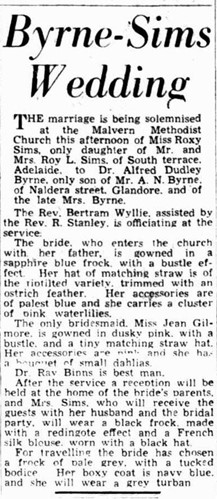
Roxy is described in her son Peters’ biography as being academically gifted and multi-talented. She played hockey for South Australia and Australia, and for many years was the leading actress with the Adelaide Repertory Theatre Company.
During their marriage they had three children, Peter, John and Penelope.
SIGNIFICANT FAMILY CONNECTIONS
Alfred Dudley Byrne’s oldest son, Peter Byrne AM, RFD, ED, FRACS, FRCSE, received multiple honours and awards during his military career including the Geoffrey Harkness Medal 1987 for outstanding contribution to the Royal Australian Army Medical Corps (RAAMC), Member of the Order of Australia Military Division 1992; he was the first Australian to receive the Michael DeBakey International Military Surgeons Award (US Armed Forces 2003, for command and leadership).
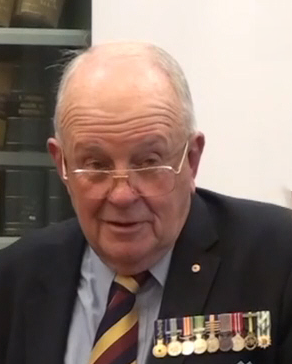
He retired from the Army in 2006 after a 50-year career during which he was awarded the Australian Active Service Medal 1945-75, the Vietnam Medal, the Australian Active Service Medal (East Timor) 2001, the Reserve Forces Decoration 1978 (with 4 Clasps), the Efficiency Decoration 1974, the National Medal, the Australian Defence Medal and the Republic of Vietnam Campaign Medal.
Adapted from South Australian Medical Heritage Society Inc., Website for the Virtual Museum. Article Titled: Alfred Dudley Byrne, Eminent gynaecologist, soldier, and sportsman
OTHER INTERESTS
Alfred Dudley Byrne was an outstanding horseman, a member of the Adelaide Hunt Club, Master of the Adelaide Riding Club and won many trophies.
He was also an enthusiastic deep-water fisherman including in the Bass Strait. He became the oldest member of the Rotary Club of Adelaide (Paul Harris Fellow) and of the Naval, Military and Air Force Club, of SA.
WAR RECORDS
Alfred Dudley Byrne served in the 10th Battalion (Army Reserve) and later as RMO (Regimental Medical Officer) 3rd Light Horse Regiment.
In 1940 he served as a Major in the Royal Australian Army Medical Corps (RAAMC) with the 2/8th Field Ambulance, Australian Imperial Force (AIF), 9th Division. He also formed a unit pipe band and trained its members as stretcher bearers.
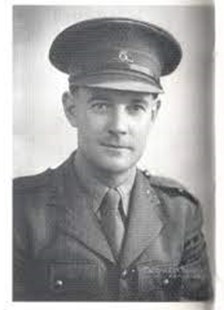
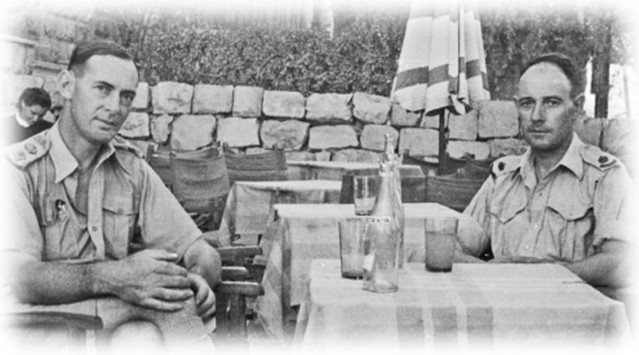
In 1941, as Officer in Command with the 2/8th Field Ambulance, his group was the first medical sub-unit that travelled furthermost West along the North African Coast. He was an excellent military leader, avoiding the Afrika Korps ambush near Derna (Libya).
During the siege of Tobruk he used discarded Italian communications equipment and ships ventilators to improve patient conditions.
He returned to Australia in mid-1942 and was promoted to Lieutenant Colonel, Commanding Officer of the 2/7th Field Ambulance (AIF), training the unit to a very high level in the Northern Territory and Queensland until December 1944, when a recurrent ankle injury terminated his front-line military service.
The Colonel Dudley Byrne Memorial Bell
This plaque was purchased in England and installed in the foyer of St Richards Anglican Church by Gordon Hoff (who served in the same Unit) to commemorate the officers and men who died and served under Colonel Dudley Byrne with the 2nd/7th Field Ambulance during World War II.
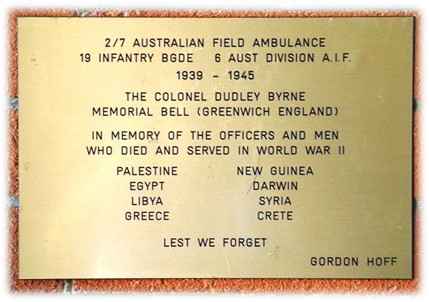
Location: Henley Beach Road & May Terrace, Lockleys, South Australia. (Note : As at 28-February-2016, the bell has been stolen – Source: Monument Australia).
DEATH & BURIAL
Alfred Dudley Byrne died on the 21st May 2001 at the age of 96, in the Kirkholme Nursing Home, Goodwood, South Australia. He is buried at Centennial Park Cemetery, Pasadena, South Australia.
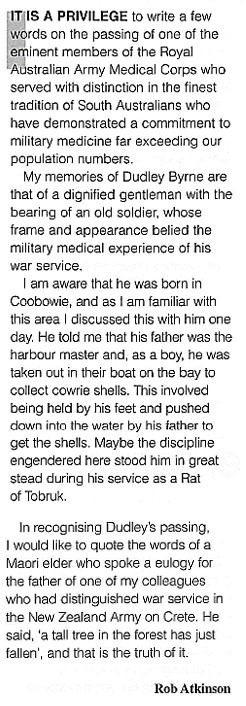
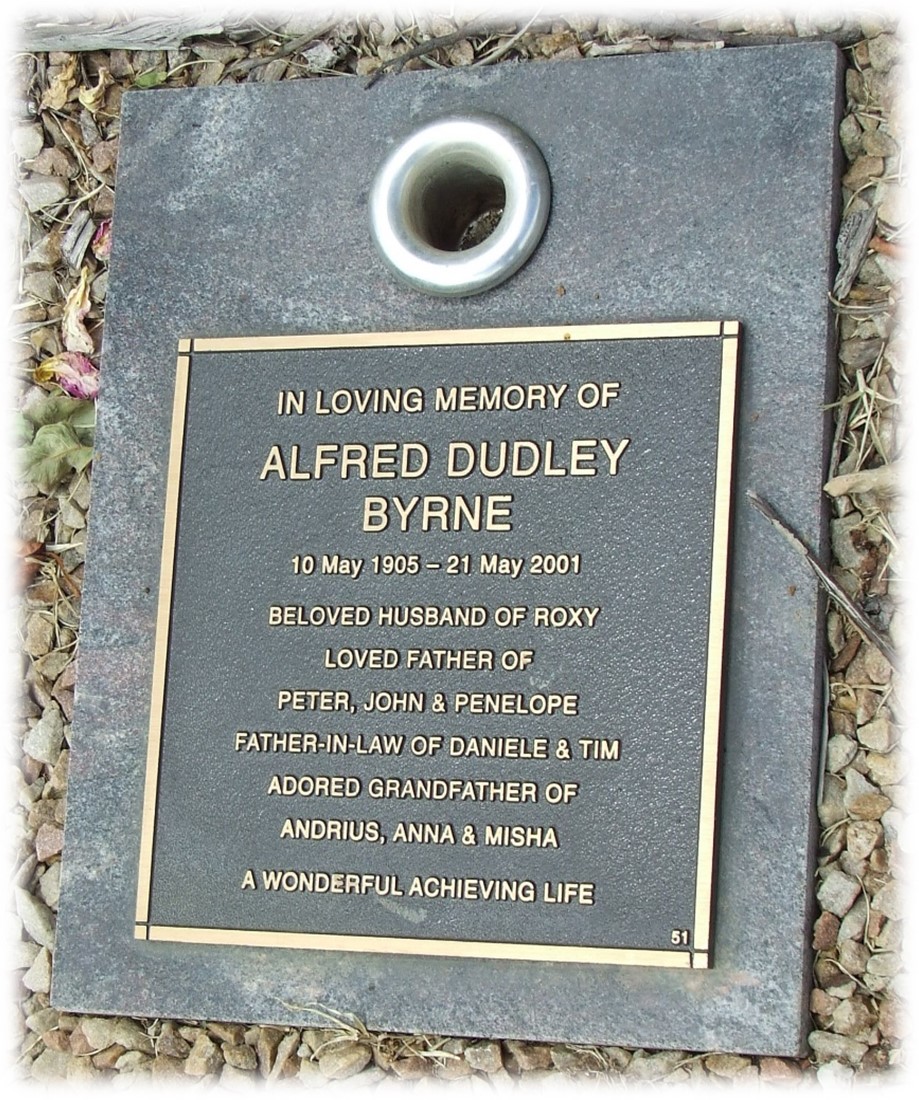
Written by Karyn Baker, CALHN Health Museum Volunteer